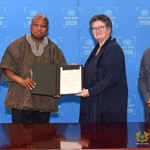
Ghana has solidified its position as a champion of global disarmament by officially depositing its instrument of ratification for the Treaty on the Prohibition of Nuclear Weapons (TPNW) at the United Nations headquarters.
This pivotal legal step, announced by the Minister for Foreign Affairs, Mr. Samuel Okudzeto Ablakwa, on Saturday, September 27, 2025, formally commits the nation to becoming a nuclear-weapon-free state.
Ghana originally signed the TPNW on September 20, 2017, and its ratification on September 26, 2025, makes it the 74th State Party globally to fully adhere to the landmark treaty, which entered into force in January 2021.
This move significantly bolsters the international coalition against nuclear arms at a time when geopolitical tensions are high.
The Minister emphasized the decisive nature of Ghana’s commitment, noting that the ratification process received rare, total support across the political spectrum, confirming a national consensus that transcends partisan politics.
Mr. Ablakwa commended the legislative and executive arms of government for their swift action: “Both the Cabinet and Parliament deserve high praise for their unanimous approval of the treaty,” he stated. He stressed that this consistency in advocating for a world free of Weapons of Mass Destruction (WMD) is a non-negotiable tenet of Ghana’s foreign policy, regardless of the ruling party.
The Foreign Affairs Minister connected the 2025 ratification to Ghana’s foundational diplomatic principles, specifically the anti-nuclear stance championed by the nation’s first president, Osagyefo Dr. Kwame Nkrumah.
Mr. Ablakwa invoked this history, recalling Nkrumah’s efforts in convening the pivotal 1962 “World Without the Bomb” conference in Accra.
This non-aligned, non-governmental assembly, held in June 1962, saw the participation of approximately 150 experts and observers from across the globe, including Nobel Peace Laureates and officials from both Eastern and Western blocs, underscoring Ghana’s early role in the non-proliferation movement.
“Nkrumah would be absolutely proud of this moment,” the Minister wrote, cementing the TPNW ratification as a fulfilment of the Pan-Africanist leader’s diplomatic legacy.
The Treaty on the Prohibition of Nuclear Weapons, adopted by the UN General Assembly in July 2017 with a vote of 122 states in favour, legally binds State Parties to a comprehensive ban on all nuclear-weapon-related activities.
Under the terms of the TPNW, Ghana is legally prohibited from engaging in any of the following activities:
- Developing, testing, producing, manufacturing, or otherwise acquiring nuclear weapons.
- Possessing or stockpiling nuclear weapons or other nuclear explosive devices.
- The use or threat of use of such weapons.
- Allowing the stationing, installation, or deployment of any nuclear weapons in its territory.
The Minister’s announcement included a photograph with representatives of the International Campaign to Abolish Nuclear Weapons (ICAN), the global civil society coalition that was awarded the 2017 Nobel Peace Prize for its instrumental role in the creation of the TPNW.
At the UN ceremony, Mr. Ablakwa met with Ms. Melissa Parke and Mr. Seth Shelden of ICAN, acknowledging their crucial advocacy in advancing the new international legal norm against the world’s most destructive weapons.